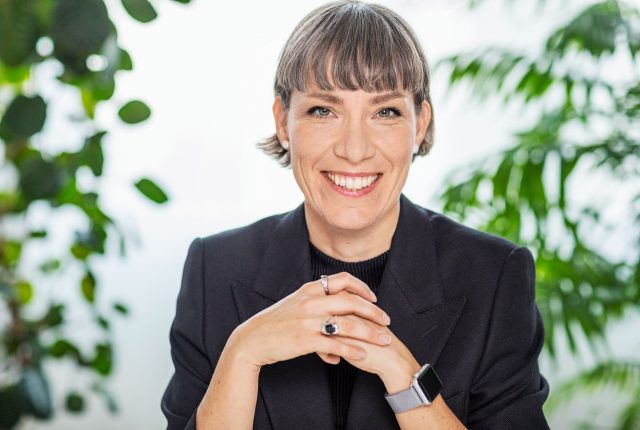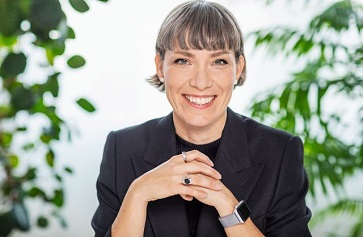Innovation the Swedish way: Darja Isaksson delivers Possible Worlds lecture

Possible Worlds lecturer Darja Isaksson is Director General of Vinnova, Sweden’s national innovation agency, and serves as a member of the Swedish government’s National Digitalization Council. Image courtesy of Darja Isaksson.
By Anushka Chakrabarti
In the latest installment of the Possible Worlds lecture series, Darja Isaksson — an internationally recognized innovation and sustainability expert — joined UCLA students, faculty and community members on March 11 to discuss innovation’s role in shaping the future. The event was held in person at Royce Hall, with a livestream reaching additional audience members virtually.
In her talk, Innovation the Swedish Way, Isaksson explored Sweden’s role as an early industrializer and examined the current narrative around innovation. She underscored the importance of the humanities in effecting change and driving new ideas.
“I think people in the humanities are often uniquely equipped with the capacity for reflection, a lot of knowledge, strong skills in narratives and storytelling — things that we need,” Isaksson shared.
A collaborative effort between the UCLA Division of Humanities and the Los Angeles-based Berggruen Institute, Possible Worlds is a biannual lecture series that invites today’s most imaginative intellectual leaders and creators to deliver talks on the future of humanity. Isaksson’s lecture marked the fourth event in the series.
David Schaberg, dean of the Division of Humanities and senior dean of the UCLA College, explained that the lecturers in Possible Worlds aim to share insights into where we are headed as a planet and as the population of that planet.
“We’ve looked at environmental questions. We’ve looked at questions of justice. We’ve looked at questions around the future of democracy,” Schaberg said.
Isaksson is the director general of Vinnova, Sweden’s national innovation agency, and serves as a member of the Swedish government’s National Digitalization Council. She described growing up in northern Sweden with her father, a telecom engineer, in a house that she called a “late eighties, early nineties maker-space.” When her father first brought home a modem, it changed her life — and sparked her career journey.
Isaksson went on to discuss how innovation has shaped public life in Sweden, walking through the historical methods the country has successfully employed in areas ranging from climate protection to union agreements.
“Public-private collaboration and research and innovation have been essential … for us in Sweden for decades,” Isaksson said, “but also organizations, working employees, employers and unions working together.”
Isaksson’s lecture was followed by a Q&A session moderated by Tobias Higbie, UCLA professor of history and labor studies. Participants joining virtually and in person were encouraged to share their questions, which ranged from “How can young people be more innovative as they go through the education system?” to “How hard is it to have breakthrough innovation nowadays with a small budget?”
Schaberg stressed that the multidisciplinary lectures in Possible Worlds are aimed at informing a sustained and engaged public dialogue.
“These are not highly specialized, highly technical talks,” Schaberg said. “The point is to get people thinking together, from whatever position they may hold.”
View the Possible Worlds lecture by Darja Isaksson on the UCLA Humanities website and on the UCLA College YouTube channel.
This article originally appeared on the UCLA Division of Humanities website. For more news and updates from the UCLA College, visit college.ucla.edu/news.


 Courtesy of Darja Isaksson
Courtesy of Darja Isaksson Courtesy of Universal Studios
Courtesy of Universal Studios Image credit: Daniel Blumstein/UCLA
Image credit: Daniel Blumstein/UCLA